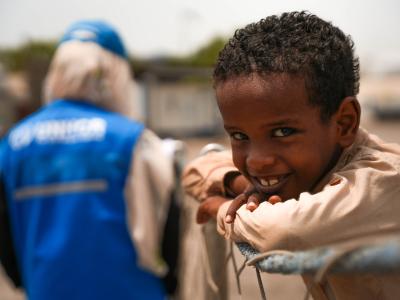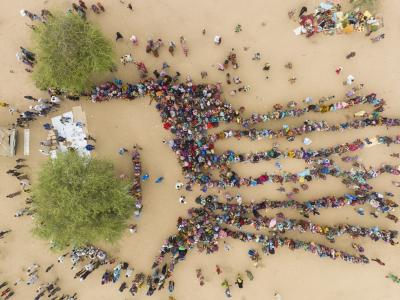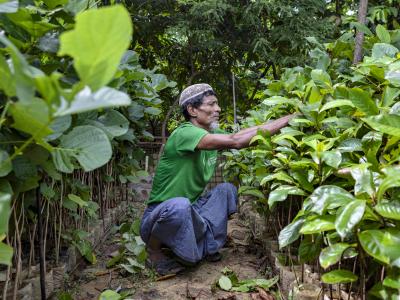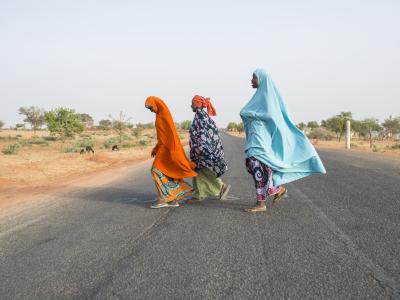Results in 2023
Refugee resettlement saw a major upturn in 2023, although the need for resettlement places continued to rise, as more people became refugees, the number of emergencies grew, and more people were stuck in protracted refugee situations. UNHCR’s estimate that 2 million refugees would need resettlement in 2023 was one third more than its estimate for 2022.
UNHCR submitted 155,486 refugees for resettlement in 2023, an increase of one third since 2022. 96,311 refugees departed, two thirds more than in 2022, and the second highest annual number in decades. The United States and Canada were the top destination countries, while Afghan, Syrian, Congolese, Eritrean, Myanmar and Somali refugees were resettled in greatest numbers.
In all, 96 UNHCR operations submitted resettlement cases to 24 countries offering resettlement places, and 18% of submissions were made to respond to the urgent or emergency needs of refugees, underscoring resettlement’s function in protection and in responsibility- and burden-sharing between States. Many of those resettled in 2023 came from countries of asylum such as Türkiye, Bangladesh, Malaysia, the United Republic of Tanzania, Lebanon, Jordan, Colombia, Rwanda or Burundi. However, most resettlements came after more than two years of waiting: the average processing time from submission to departure was 783 days in 2023, up from 751 days in 2022.
The identification of refugees in need of resettlement is part of UNHCR’s ongoing protection and assistance activities. A consistent application of the different submission categories – including “women and girls at risk” and “survivors of violence and/or torture” – is part of UNHCR’s accountability to affected people. UNHCR also employed an increasingly strategic and data-driven approach to resettlement, in order to allow for the identification of larger numbers or groups of refugees in protracted situations, such as in Uganda, where UNHCR adopted a tool called Humanitarian Response Identification, based on an algorithm of relevant protection, socio-demographic and vulnerability indicators to identify refugees for resettlement.
UNHCR released a new “Resettlement handbook” in May 2023, replacing the 2011 version and offering comprehensive operational guidance on processing resettlement cases. It incorporates best practices from different countries to improve processing efficiency while maintaining and strengthening protection and integrity measures.
Despite the increase in resettlement quotas generously provided by States for 2023, the available places remained far below the needs. The number of refugee resettlement departures facilitated by UNHCR was less than 5% of the estimated 2 million needed in 2023. UNHCR projected a further 20% rise in resettlement needs in 2024. In addition to resettlement facilitated by UNHCR, there were almost 58,000 other resettlement departures in 2023.
Backers of a multi-stakeholder pledge on resettlement at the Global Refugee Forum renewed commitment to increase resettlement quota, advocate to grow resettlement, ensure access to resettlement for at-risk populations, including LGBTIQ+ refugees; multi-year planning, and meaningful refugee engagement.
Complementary pathways
Alongside resettlement, UNHCR continued to work with a myriad of various partners to ensure refugees unhindered access to legal migration pathways, including for family reunification or to work or study. The Global Refugee Forum galvanized commitment for complementary pathways and family reunification, with nearly 100 actors, including States, private sector and civil society, supporting four multi-stakeholder pledges on skills-based pathways, family reunification, community sponsorship and refugee travel documents.
The expansion of complementary pathways has taken time as the legal frameworks are not entirely inclusive of refugee mobility and necessary resources to start programming in this area have not yet been fully committed. But the Forum marked an important moment of moving from pilots to larger scale projects, particularly with the launch of the Italian labour mobility programme for migration, which includes refugees, and commitments from other countries to consider or expand their migration frameworks to ensure refugee inclusion—as in Australia and Germany—while ensuring that their international protection needs are met. Together with other actors, UNHCR continued to build the infrastructure to support the scaling up of complementary pathways and refugees access to such opportunities including through train-to-hire models and linked labour needs with academic opportunities.
UNHCR developed its first guidance on complementary pathways, coupled with a learning course and websites. Together with International Institute of Humanitarian Law at Sanremo, it trained UNHCR staff and supported the holding of the 2nd International Forum on Complementary Pathways. UNHCR also developed its first Operational Guidelines on Family Reunification and worked closely with a number of partners to develop a comprehensive support framework for their implementation through partnership within the family reunification pledge. UNHCR, as part of the Global Refugee Sponsorship Initiative, supported the launch of the Global Sponsorship Fund and Brazil’s commitment to pilot a new sponsorship programme through multi-stakeholder coordination.
UNHCR’s advocacy led to a number of key countries joining the machine-readable refugee travel documents pledge, whereby some of the biggest refugee-hosting States, such as Ethiopia and Chad, committed to issue travel documents that protect refugees from refoulement and facilitate their cross-border travel for complementary pathways opportunities in work or study. UNHCR also enhanced its collaboration with the International Civil Aviation Organization (ICAO) to streamline the advocacy towards wider issuance and acceptance of machine-readable refugee travel documents, including but not limited to Convention Travel Documents. Expansion of access to such documents requires technical and funding support, but their acceptance would increase the accessibility of skills-based opportunities for refugees.
Given that complementary pathways essentially envision refugee inclusion in legal migration, it is challenging to capture refugee-specific arrival data, as they are typically folded into the general legal migration statistics maintained by States. Additionally, pathways should normally allow refugees autonomy in access without UNHCR direct case support or engagement, making UNHCR-owned data on the topic rather limited as well.
UNHCR continued its collaboration with the OECD to gather, analyse and publish indicative data on complementary pathways. The “Safe pathways for refugees IV” report indicates that OECD countries and Brazil issued approximately 215,000 residence permits to Afghan, Eritrean, Iranian, Iraqi, Somali, Syrian and Venezuelan refugees for the purposes of family reunification, education or employment opportunities in 2022. Family permits were the most issued (57% of all permits), making family reunification the most important legal pathway for refugees.
In 2023, UNHCR operations invested in helping individuals to learn about and access family reunification and complementary pathways. In Ethiopia, UNHCR and partners facilitated complementary pathways for 3,257 refugees, more than 96% of whom were admitted through private sponsorship pathways. UNHCR has invested heavily in supporting refugees’ departures for sponsorship pathways for Canada, in particular.
Core indicators

15.1 Number of refugees submitted by UNHCR for resettlement

15.2 Average processing time from resettlement submission to departure under normal priority
Financial overview
Global expenditure and budget for Resettlement, complementary pathways and family reunification
$119 million spent against a budget of $199 million
$80 million of unmet needs or 40% of the budget




